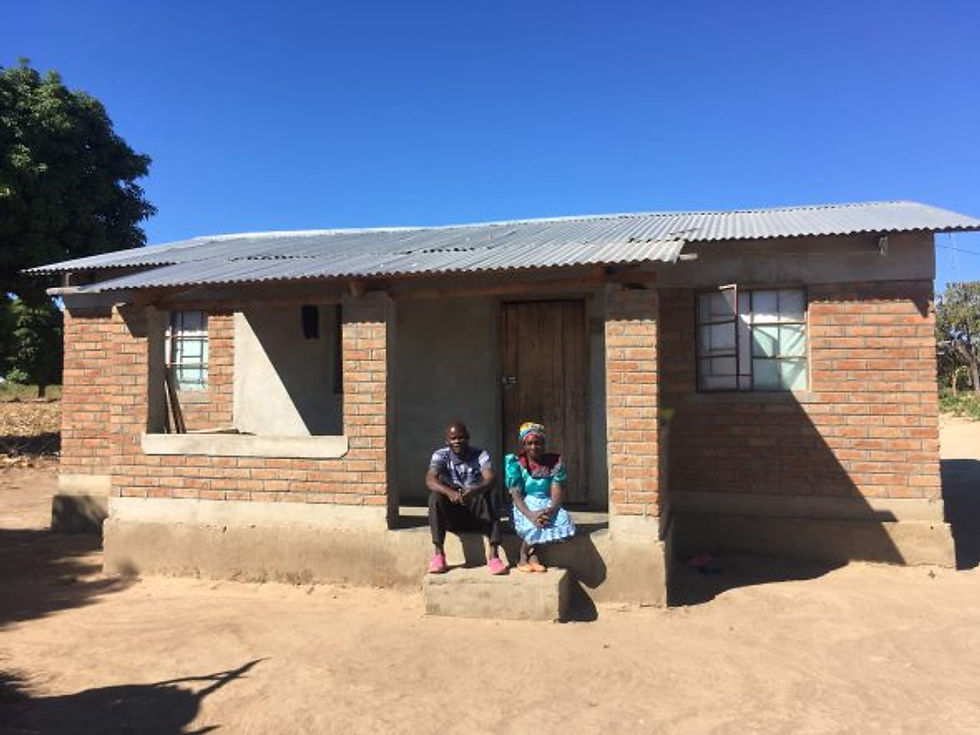Success Story: Down on McDonald’s Farm
- SIA Team
- Mar 10, 2020
- 3 min read
Updated: Apr 13, 2020
“If you live in a house like this, something good has happened,” McDonald Kajani told us, orienting us to the context of Manyamula Village in northern Malawi. Last June, he proudly showed us around his four-bedroom home, with new wood floors and glass windows. Whereas before he had a thatched roof, now he has corrugated tin sheets.

McDonald and his wife in front of their new, fancy home
Out front, McDonald has nine cows and four pigs. Each is an investment. The cows help plow his farm and provide manure. The pigs can be sold when he needs cash. His maize granary is full! It is enough to last his family of six the whole year, meaning they have achieved the enviable status of “food secure.”

McDonald with his cows in the corral in front of his house.
McDonald did not start out with all this stability. He used to grow a few vegetables in a small patch of land. He didn’t have enough food. The thatched roof leaked and needed to be replaced regularly. In 2010, he received a Spirit in Action Small Business Fund grant and used that $150 to start farming as a business, rather than just for subsistence. I have visited McDonald’s farm each of the four times that I have been to Malawi. (Photo from 2014) “Your coming is an encouragement to me,” he said, as he welcomed us through the hedge into the farm. McDonald grows kale, potatoes, peppers, amaranth (highly nutritious green and grain) and mustard (greens). There is a waterhole nearby and so he can grow vegetables even in the dry season.

Tanya, McDonald, SSIA Board Member Kathleen King, and interpreter Winkly Mahowe with kale from McDonald’s farm. (June 2019)
He has a contract with a local school and supplies them with food three days a week. This gives him a more steady income than selling at the market. He can make about $12 each week with this contract.
Complicating the Narrative
I don’t want to present a story that is too liner and simple. It is not that a $150 grant was all it took to take McDonald from rags to riches. The grant helped. His business sense and tireless work on the farm are huge factors too. His family also helps with the farming and animal rearing.
McDonald’s connection with the Manyamula COMSIP Cooperative (a long-time SIA grant partner) gives him stability. This locally-run savings and loans cooperative is part of his success. When he has profits, he buys shares in the cooperative as a way to save. He can take low-interest loans when things are not going well. The more he saves, the more he can borrow. The Cooperative lets members borrow double to amount of the value of their shares.

Meeting with McDonald and his family on their bean farm in 2017.
This change in McDonald’s life doesn’t change the cyclical challenges of farming. He is vulnerable to climate change – droughts, heavy rains – and depleted soil quality. He is reliant on the local market.
However, it is also right to celebrate and acknowledge the amazing transformation that he and his family have seen in the last ten years. Cooperative members say that McDonald is an inspiration, and that he teaches farming to others who are wanting to move towards sustainability and prosperity. I look forward to seeing what he will have done by the time I next visit McDonald’s farm!

2011 – One year after McDonald received the Small Business Fund grant. At this point he had earned enough to buy a new cell phone. He was also dreaming of his new house: he had bought bricks and 16 iron sheets for his roof.


Comments